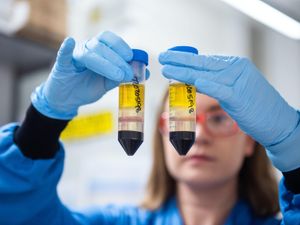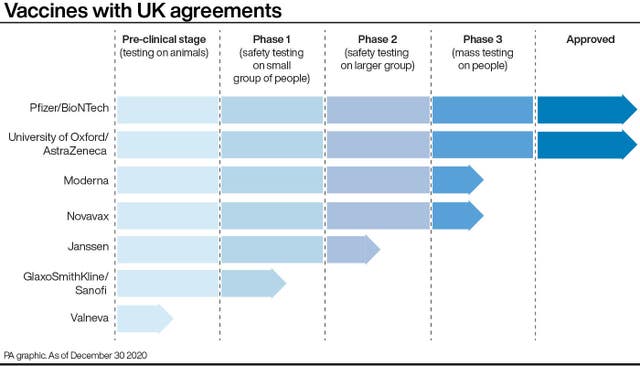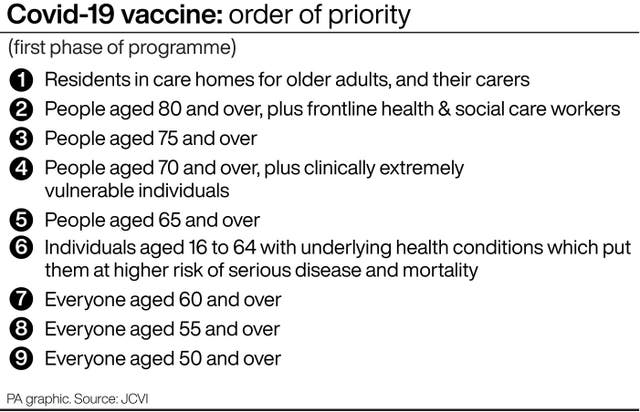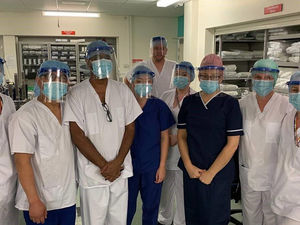Oxford/AstraZeneca Covid-19 vaccine approved in UK for mass rollout
The vaccine has been shown to prevent severe disease and stop people contracting Covid-19.

A Covid-19 vaccine from Oxford University and AstraZeneca has been approved for use in the UK, with the first jabs expected to be given on Monday.
The jab, which has been described as a “game changer”, was given the green light by the Medicines and Healthcare products Regulatory Agency (MHRA).
Health Secretary Matt Hancock said the vaccine is a “great British success story” and “hundreds of thousands” of doses would be available for rollout next week, including to care homes.
He told Sky News: “I am now, with this approval this morning, highly confident that we can get enough vulnerable people vaccinated by the spring that we can now see the route out of this pandemic.”
He said there would be a difficult few weeks ahead but the “vaccine provides that route out” of the pandemic.
“We have all just got to hold our nerve over the weeks to come.”
Prime Minister Boris Johnson tweeted: “It is truly fantastic news – and a triumph for British science – that the @UniofOxford/@AstraZeneca vaccine has been approved for use.
“We will now move to vaccinate as many people as quickly as possible.”
The news comes amid increasing strain on hospitals in England, where the number of Covid-19 patients is the highest it has been during the pandemic.

Mr Hancock is due to announce any changes to tier areas in a statement to the Commons on Wednesday.
“We are facing a very significant challenge in the NHS right now,” he told Sky News.
“There has been a significant rise in the number of cases – the highest number of cases recorded yesterday, 53,000 cases.
“We are going to have to take further action.”
The UK has ordered 100 million doses of the Oxford University vaccine, enough to vaccinate 50 million people.
Mr Hancock said the plan is to vaccinate all vulnerable groups first, but all adults, including the under-50s, will eventually be offered a jab.

England’s chief medical officer, Professor Chris Whitty, said the jab is “safe and effective”, while Dr June Raine, chief executive of the MHRA, said her team of scientists and clinicians had “very carefully and methodically and rigorously reviewed all the data on safety, on effectiveness, and on quality”.
She added: “No corners, whatsoever, have been cut.
“The safety of the public always comes first.”
Dr Raine said each batch of vaccines is individually checked and the first batch of the new jabs was released last night.
She added: “Having an effective vaccine is the best way to protect us, and may save tens of thousands of lives.”
Data published in The Lancet medical journal in early December showed the vaccine was 62% effective in preventing Covid-19 among a group of 4,440 people given two standard doses of the vaccine, when compared with 4,455 people given a placebo drug.
Of 1,367 people given a half first dose of the vaccine followed by a full second dose, there was 90% protection against Covid-19 when compared with a control group of 1,374 people.
The MHRA has authorised two full doses of the vaccine, with the second dose given four to 12 weeks after the first.
It said the vaccine was up to 80% effective when there was a three-month interval between the first and second doses, according to data that has yet to be published in a medical journal.
A first dose of the jab gives 73% effectiveness from three weeks after immunisation until a second dose at 12 weeks, according to the MHRA and the Joint Committee on Vaccination and Immunisation (JCVI), although some experts questioned how long this protection would last without a second dose.

The MHRA said it could not recommend a half-dose, full-dose regime for the Oxford vaccine, saying it was “not borne out” by the full analysis.
In the trial data published in The Lancet, 10 people given the placebo dummy drug were admitted to hospital with coronavirus, including two with severe Covid which resulted in one death.
But among those receiving the vaccine, there were no hospital admissions or severe cases.
Mr Hancock said allowing a second dose up to 12 weeks later was “important because it means that we can get the first dose into more people more quickly and they can get the protection the first dose gives you.”
Professor Wei Shen Lim, of the JCVI, said that with Covid infection rates currently at a high level, the “immediate urgency is for rapid and high levels of vaccine uptake”.
He added: “This will allow the greatest number of eligible people to receive a vaccine in the shortest time possible and that will protect the greatest number of lives.”
AstraZeneca chief executive Pascal Soriot told BBC Radio 4’s Today programme deliveries will be ramped up “very rapidly” in the first and second week of January.
He added: “The vaccination will start next week and we will get to one million a week and beyond that very rapidly.
“We can go to two million. In January we will already possibly be vaccinating several million people and by the end of the first quarter we are going to be in the tens of millions already.”
Asked whether two million vaccinations per week was possible, Mr Hancock told Times Radio: “That’s absolutely deliverable by the NHS.”
Professor Andrew Pollard, director of the Oxford Vaccine Group, who led the clinical trial, said the approval was “a landmark moment”.
But he said the impact of vaccines is “about getting them into people’s arms, stopping the virus from causing severe disease and hospitalisation, which we know that all of the vaccines can do very efficiently.”
Shadow health secretary Jonathan Ashworth said the vaccine approval is “good news”, tweeting: “Now let’s go hell for leather to get jabs rolled out.”
Scotland’s First Minister Nicola Sturgeon tweeted: “Much needed good news on the Covid front – and it is very good news.
“We’ve still got some difficult winter weeks ahead – but the light at the end of the tunnel just got a lot brighter.
“Let’s stick with it now – spring will bring better times.”
The Oxford vaccine, which is being made in Oxfordshire and Staffordshire, can be stored in a standard fridge, unlike the Pfizer/BioNTech jab, which needs cold storage of around minus 70C.
This means the Oxford vaccine is easier to roll out to places such as care homes and GP surgeries.





